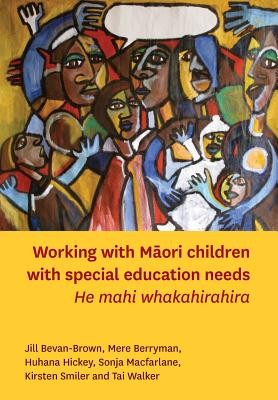
- We will send in 10–14 business days.
- Author: Jill Bevan-Brown
- Publisher: Nzcer Press
- Year: 2015
- Pages: 294
- ISBN-10: 1927231434
- ISBN-13: 9781927231432
- Format: 17 x 24.4 x 1.6 cm, softcover
- Language: English
- SAVE -10% with code: EXTRA
Working with Māori Children with Special Education Needs (e-book) (used book) | bookbook.eu
Reviews
Description
Who are Māori children with special education needs? Why would working with them be any different to working with other children with special education needs? Why is this a highly important job? This book provides essential information for those striving to provide culturally responsive, effective education for Māori children. Working with Māori Children with Special Education Needs emphasises the importance of learning from the past and listening to Māori children, their parents and wider whānau (families). It explores the key components of culturally responsive, evidence-based, special education practice; it describes holistic and inclusive responses to educating all tamariki (children), especially those with identified special education needs; and it discusses a paradigm for Māori disability identity-whānau hauā. This book also features specific categorial studies, outlining Māori concepts and advising professionals. The studies explore the needs of deaf children and their whānau; outline general, educational and cultural barriers for Māori who are vision impaired or blind; and discuss physical disability, intellectual disability, autism spectrum disorder, and giftedness from a Māori perspective. This book then considers ways that teachers and whānau can capitalise on their respective strengths and knowledge in order to take joint responsibility for students' learning and behaviour.
EXTRA 10 % discount with code: EXTRA
The promotion ends in 19d.10:43:51
The discount code is valid when purchasing from 10 €. Discounts do not stack.
- Author: Jill Bevan-Brown
- Publisher: Nzcer Press
- Year: 2015
- Pages: 294
- ISBN-10: 1927231434
- ISBN-13: 9781927231432
- Format: 17 x 24.4 x 1.6 cm, softcover
- Language: English English
Who are Māori children with special education needs? Why would working with them be any different to working with other children with special education needs? Why is this a highly important job? This book provides essential information for those striving to provide culturally responsive, effective education for Māori children. Working with Māori Children with Special Education Needs emphasises the importance of learning from the past and listening to Māori children, their parents and wider whānau (families). It explores the key components of culturally responsive, evidence-based, special education practice; it describes holistic and inclusive responses to educating all tamariki (children), especially those with identified special education needs; and it discusses a paradigm for Māori disability identity-whānau hauā. This book also features specific categorial studies, outlining Māori concepts and advising professionals. The studies explore the needs of deaf children and their whānau; outline general, educational and cultural barriers for Māori who are vision impaired or blind; and discuss physical disability, intellectual disability, autism spectrum disorder, and giftedness from a Māori perspective. This book then considers ways that teachers and whānau can capitalise on their respective strengths and knowledge in order to take joint responsibility for students' learning and behaviour.


Reviews